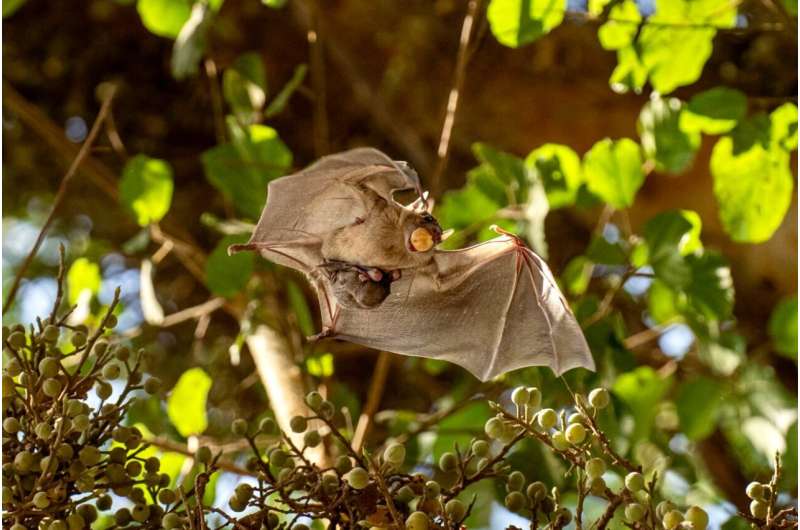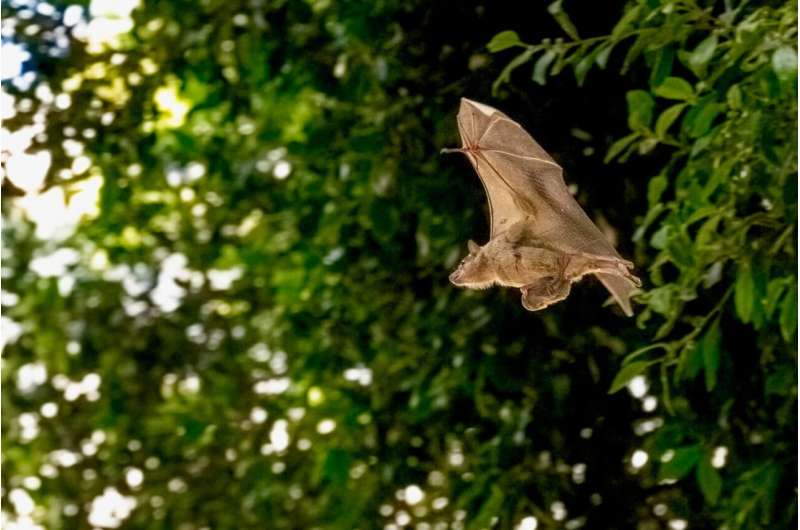This article has been reviewed according to Science X's editorial process and policies. Editors have highlighted the following attributes while ensuring the content's credibility:
fact-checked
peer-reviewed publication
trusted source
proofread
A new study finds that pregnancy affects bats' sensing capabilities

There have been several studies pointing to an impairment of the cognitive abilities of pregnant women. A new Tel Aviv University study reveals that bats, too, experience a decline in their ability to hunt and orient in space during pregnancy.
This impairment stems from the fact that they produce about 20 percent fewer calls, the sounds that allow them to orient themselves using echolocation, on top of flying at a slower pace and at a lower altitude. The researchers highlight the fact that, to the best of their knowledge, this is the first evidence of pregnancy affecting mammals' sensory abilities.
The study was led by Mor Taub, a research assistant in the laboratory of Prof. Yossi Yovel, head of Tel Aviv University's Sagol School of Neuroscience and faculty member of the School of Zoology, Wise Faculty of Life Sciences. The study's findings were published in the journal BMC Biology.
Mor Taub explains, "At the peak of pregnancy, bats carry about 20 percent more than their normal body weight, and it is clear that this excess weight impacts their flying capacity. In this study, we wanted to check whether and to what extent pregnancy affects bats' echolocation ability, their sonar. Bats' sonar is based on the emitting and receiving of strong and frequent sounds in order to map their surroundings."
"To make these sounds, bats, like us humans, need to transfer high-pressure air from the lungs through the vocal cords, or vocal membranes, which involves many muscles, such as the chest and diaphragm. We wanted to see if the excess weight from pregnancy affects the production of sounds."

To this end, Prof. Yovel and his colleagues taught bats to search for and land on a small landing pad in a flight room in the bat laboratory at Tel Aviv University's Garden for Zoological Research. They recorded the echolocation of two groups: pregnant bats and non-pregnant bats. The researchers found that the rate at which the pregnant bats emitted sounds was significantly lower than that of the control group, with 20 percent greater intervals between each sound.
Prof. Yovel says, "Bats change the rate of the sounds they make in accordance with the level of difficulty of the task. The average rate is about 10 calls per second, but when the bat lands, this rate can increase to 100 calls per second. The pregnant bats produced sounds at a rate of only about seven per second, and flew a little slower and lower. Obviously, this slowing down is likely to affect their hunting."
"When a bat makes fewer calls, it gathers less information about the environment, its chance of colliding with objects increases, and its chance of finding food decreases—and this is at a time when the bat needs extra food to sustain the fetus in its womb. In the second phase of the study, we used a computer simulation to simulate the effect of the decreased rate of calls on the bats' performance, and indeed, we saw that the slowed rate makes it more difficult for the bats to locate prey."
The bats in the experiment were of the Kuhl's pipistrelle species, tiny bats that weigh only about six grams (when they are not pregnant). These bats are very common in Israel, and feed mainly on mosquitoes. Despite their weight, bats can live for decades, and their pregnancies are therefore also relatively long, lasting about four months. Previous studies conducted on other species of bats have shown that during pregnancy, bats tend to change their diets. To date, the assumption was that this change in diet was due to the bats' difficulty in flying, but the current study raises the possibility that the change may also be due to their sensory difficulty in detecting certain types of prey.
"This is the only evidence we found in the professional literature showing that pregnancy affects mammals' sensory abilities," says Mor Taub.
"We assume that there are similar cases in other species as well, but this is the first time that researchers have been able to measure and demonstrate the impairment empirically. Beyond the scientific interest, it is important to preserve mammal species in the wild, especially during pregnancy and newborn care, since animals are particularly vulnerable during this period."
More information: Mor Taub et al, Pregnancy-related sensory deficits might impair foraging in echolocating bats, BMC Biology (2023). DOI: 10.1186/s12915-023-01557-7
Journal information: BMC Biology
Provided by Tel-Aviv University





















